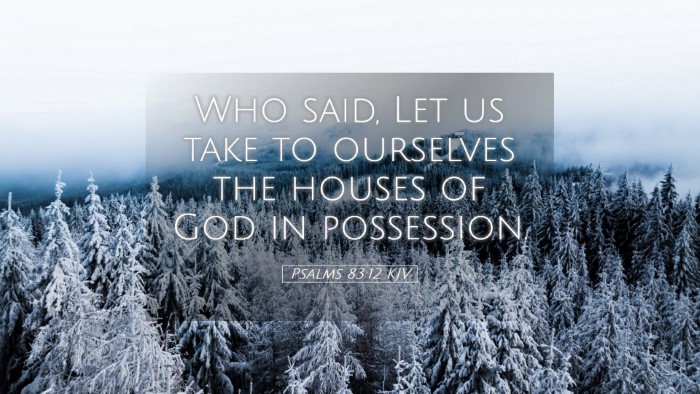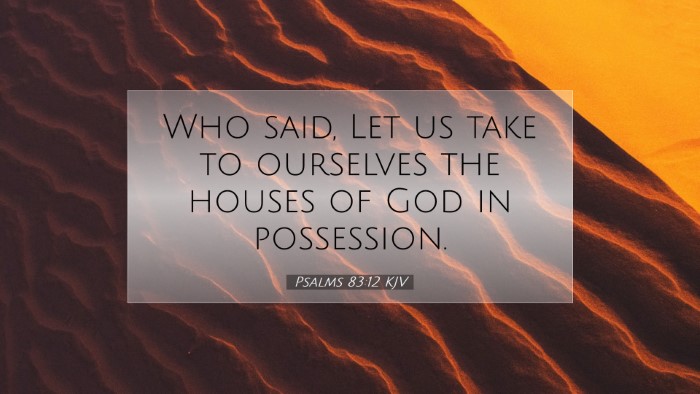Psalms 83:12 - Biblical Commentary
Verse: "Who said, 'Let us take for ourselves the houses of God in possession.'" (Psalms 83:12, NKJV)
Introduction
The verse of Psalms 83:12 serves as a solemn reminder of the detrimental ambitions of neighboring nations against God's people. This commentary seeks to explore the depths of meaning found within this text, blending insights from renowned public domain commentaries, including those by Matthew Henry, Albert Barnes, and Adam Clarke.
The Context of Psalms 83
Psalms 83 is a communal lament that highlights the threats posed by a confederation of nations against Israel. The psalmist is invoking divine intervention, calling God to act against these enemies who conspire to obliterate His people and their worship.
Matthew Henry notes that this psalm reflects the dark days when Israel was surrounded by adversaries who sought to vilify their covenant with God and usurp their possessions, particularly the land which was given by God.
The Enemies of God’s People
-
Identification of Adversaries: The psalm outlines various nations, such as Edom and Moab, who stand in opposition to Israel. Adam Clarke emphasizes the unity of these nations, suggesting a coordinated effort against God's people.
-
Spirit of Conspiracy: These nations are characterized by a spirit of enmity and conspiracy. Albert Barnes argues that the desire to "take for ourselves the houses of God" signifies their intent not merely to conquer land but to erase the worship and heritage of Israel.
The Implications of Their Declaration
The phrase "Let us take for ourselves the houses of God" reveals a profound disrespect for what God has established. According to Matthew Henry, this reflects a pathological greed and a blatant disregard for God's sovereignty over His people.
Clarke notes that “houses of God” may also signify not only physical structures but spiritual realities—the very essence of God's presence and community, which is under threat by these hostile forces.
Theological Reflections
The intentions of these nations encapsulate the timeless strife between God’s kingdom and worldly desires. The psalmist's cry speaks to the heart of spiritual warfare that exists in both the ancient context and the present day.
-
God’s Sovereignty: Despite the threats, there is an implicit faith in God’s sovereignty. Barnes encourages us to reflect on God's ultimate control over the events of the world, reminding believers that no earthly power can truly 'possess' what the Lord has decreed for His people.
-
The Nature of Worship: True worship can never be seized; it is a relational covenant fortified by grace. This reminds pastors and students alike that genuine worship arises from a heart aligned with God, rather than mere physical constructs.
Practical Application
For modern believers, this psalm compels an examination of our responses to external pressures and challenges. Here are some applications derived from the commentary:
-
Awareness of Spiritual Warfare: Understanding that just as ancient Israel faced enemies, Christians today face spiritual forces seeking to undermine their faith and heritage.
-
Dependence on God: This psalm should drive believers to prayer, seeking divine intervention in their lives and the collective life of the Church.
-
Valuing Worship: It raises questions about how we value worship and community in our lives, ensuring that our devotion to God remains central despite external pressures.
Conclusion
Psalms 83:12 is a poignant reminder of the challenges faced by the people of God throughout history. By utilizing insights from Matthew Henry, Adam Clarke, and Albert Barnes, we gain a richer understanding of the psalm's implications. It encourages both a deep reliance on God's providence and a fortified commitment to worship amidst opposition.
In a world where the 'houses of God' may be threatened, the call remains to uphold them with unwavering faith, trust in divine sovereignty, and prayerful advocacy for the Church.


